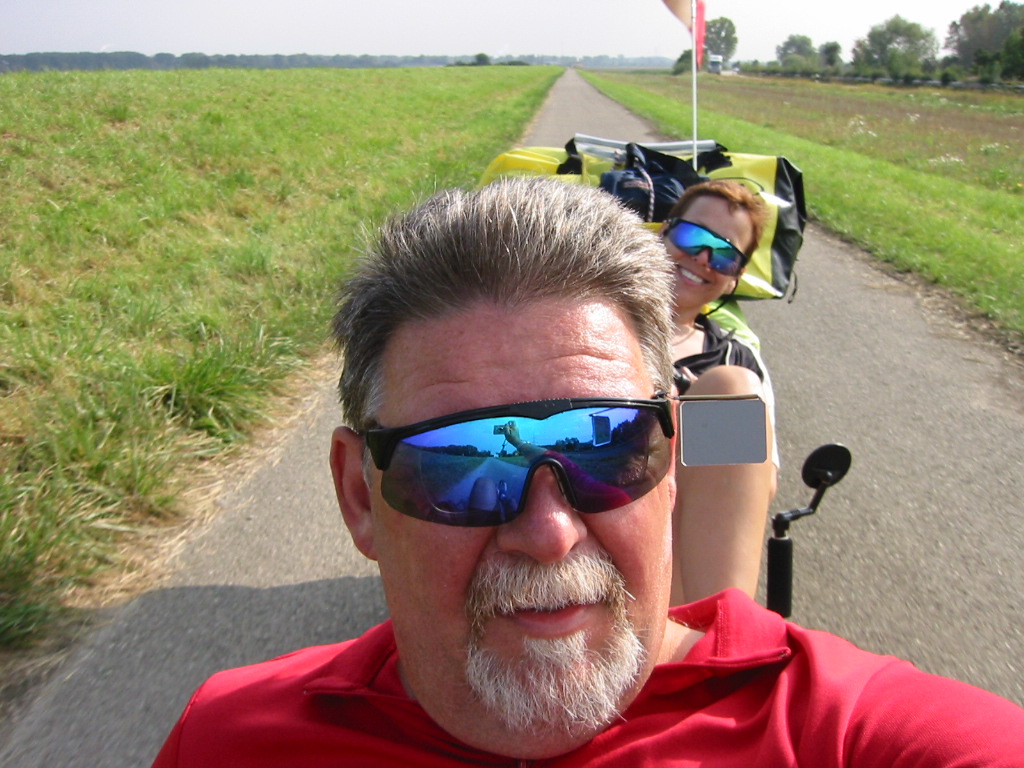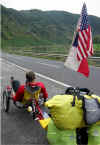Gear

On our previous bike tours, we could carry as much excess crap as we wanted because someone else was responsible for hauling the stuff to our next stop. For this trip, everything had to fit on the bike, which presents you with an interesting question -- do you really need to bring that kitchen sink?
Vehicle: Greenspeed GTT5S tandem recumbent
tricycle. With 72 speeds, hydraulic disk brakes, and cushy seats, the
GTT is the ultimate touring machine.  Built to our measurements, the GTT is designed with removable seats and special
frame couplings that allow you to fit an 11 1/2 foot long contraption into a
single standard bicycle box and large duffel bag. The duffel holds the
seats, plus the panniers. We only had to check two bags, but Continental
still charged us extra for the bike ($80 each way).
Built to our measurements, the GTT is designed with removable seats and special
frame couplings that allow you to fit an 11 1/2 foot long contraption into a
single standard bicycle box and large duffel bag. The duffel holds the
seats, plus the panniers. We only had to check two bags, but Continental
still charged us extra for the bike ($80 each way). 
Bags: All our clothing and gear is carried on the bike. We used
a set of Performance Epic panniers (the fluorescent yellow rain covers enhance
visibility) for our main gear bags, then topped them with a waterproof gear bag
designed for use with the BOB bike trailer.  The BOB bag is large enough to
accommodate Jayne's backpack, plus our spare shoes, a change of clothes, and
toiletries and is attached to the luggage rack with three bungee cords. A
large fanny pack holding immediate needs (cash, credit cards, ID, and notebook)
is strapped to the top of the stack for easy access. We estimate that our
total baggage load was 50 - 60 lbs. Groceries and snacks are carried in
plastic bags hung onto the seat back, giving us that ever-popular Grapes of
Wrath chic.
The BOB bag is large enough to
accommodate Jayne's backpack, plus our spare shoes, a change of clothes, and
toiletries and is attached to the luggage rack with three bungee cords. A
large fanny pack holding immediate needs (cash, credit cards, ID, and notebook)
is strapped to the top of the stack for easy access. We estimate that our
total baggage load was 50 - 60 lbs. Groceries and snacks are carried in
plastic bags hung onto the seat back, giving us that ever-popular Grapes of
Wrath chic.
Clothing: Virtually all made of quick-drying fabrics. Though we tried to limit to 3 sets of bike clothes and 3 sets of regular clothes, a few additional items slipped in (seems that the shoes kept multiplying - particularly when you add the bike shoes). We were prepared for rain and colder weather and ended up not wearing a number of cool weather items and only wearing the rain gear on one day.
Tools and Bike Accessories: Most carried in pannier pockets or strapped directly on the bike. Topeak Alien multi-tool, special wrench for the bike frame couplings, Leatherman tool, small crescent wrench, Topeak Road Morph pump, chain tool with spare links, extra tubes (with Slime sealant), tube patch kits, zip ties, lock, disposable plastic gloves, lube, and of course, duct tape.
| Mechanical Problems
Considering the distance traveled and variety of surfaces crossed, we had few mechanical problems, none of which delayed us for more than an hour at a time - one flat (patched), one broken chain, a couple of stops to realign the captain or stoker's pedals, and a few adjustments of the gearing connections to the 3 speed hub gears. Daily maintenance consisted of checking tires and frame couplings (which had to be tightened every couple of days). We did suffer a bit of damage to the paint on the bottom of the frame and bending of a cable guide from high centering the bike on curbs and ramps, but nothing that couldn't be easily fixed with a bit of touch-up paint. |
Other Gear: Camera (Canon Powershot S300 digital - 2.1 megapixel, sized to fit in your shirt pocket - a great improvement in size and picture quality over our previous Sony), transformer/adapter, battery charger, note pad, business cards, maps, guidebooks, dictionary/phrase book.
Maps: A combination of cycling and auto maps. The cycling maps for Germany are produced by the German national bicycling club, the AFDC. These maps are high resolution and are regionalized. For France, we purchased area cycling maps at a bookstore in Germany. A automotive map (Michelin) would probably be adequate for France, since there are fewer dedicated bike paths than Germany, and most of your riding is done on secondary ("D") roads.